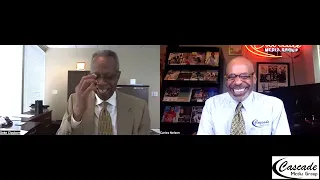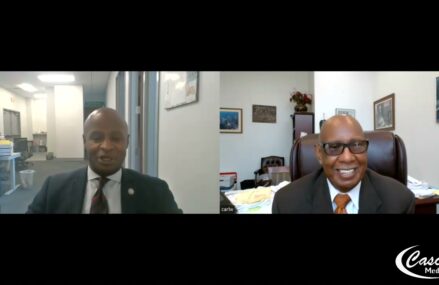Kansas City Mayor Quentin Lucas commissioned to give some recommendations on how the Kansas City might proceed as it relates to reparations. Many explanations are offered, all of which undoubtedly play their role: Black Americans are more likely to be employed by public facing jobs that do not have a work from home option, offer little to no sick leave, and/or don’t offer health insurance. Black Americans are also more likely to live with chronic illness, instability in housing due to rental markets, and poverty.
Although it’s impossible to pin down any one factor on which to direct laser focus, one thing is clear: the disproportionate impact the coronavirus has on Black Americans mirrors the various forms of continued, systemic oppression this country has leveraged against Black people since the first person was forced here from Africa. Because of this, we can no longer ignore reparations as a plausible solution to remedy past wrongs.
In the time since slavery, decade after decade passes without repentance or repayment for that forced labor, but the American economy continues to benefit from the immeasurable contributions of people who were enslaved. Now, generations later, their descendants remain unable to reap the benefits of the American economy, and continue to be shut out from opportunities to thrive, and in many cases, survive.
Western Center deals with the fallout of America’s anti-Blackness and legacy of slavery every day when we work to protect people impacted by poverty. We’re advocating for reparations because American racism still perpetuates disproportionately high rates of poverty among Black Americans, in addition to worse social outcomes by most measures — from COVID-19 death rates, to incarceration rates, to homelessness, to employment and education.
This is an American problem, so it’s a California problem; but it’s also a California problem because the same racist legal system created to enshrine white supremacy in the rest of America, which actively prohibits Black Americans from wealth building opportunities, also exists in California. In fact, many California homeowners can still find “racial covenants” in their home deeds, stating only whites should own the property. These deeds exist for homes across California – including some owned by a handful of Western Center staff. Racial disparities in income, access to credit, and wealth generation, even while controlling for factors like education, are still pervasive in American society, and in California.
It’s time to look to scholars and experts like Duke Professor William Darity Jr. and A. Kirsten Mullen, who have spent years researching and thinking through delivery systems and methods for reparations. AB 3121 by Assembly member Shirley Weber, which was signed into law by Governor Newsom, will use available expertise to form specific recommendations for the California Legislature on how we might move reparations forward as a state.
America has not done right by the people who built this country. It shouldn’t take a global pandemic for people to see how much neglect Black Americans face, but we’re here now. Western Center is not content to just see the numbers of Black Americans being killed by COVID roll in – we feel the pull to act.
Our support for AB 3121 in California is only one step. As an organization, we are reassessing all of our work to think through how we will be a part of the change that actively, finally, creates a state and country that is just for us all.
Our complete Letter of Support for AB 3121 can be found here. An excerpt is available below.
_______________________________________________________
Background
America’s history with slavery began in 1619, when “20 and odd negroes” were brought to what was then known as “Point Comfort” in Virginia. For 250 years after these first captives were brought to the North American continent, Black people were enslaved, facing the cruelest imaginable treatment, considered property, hardly better than livestock. They were regularly beaten and lynched for frivolous infractions, and enslaved women had no protections from rape or other forms of domestic cruelty. Slavery also disrupted families: one third of marriages were forcibly dissolved, and one in five children were separated from their parents. While people enslaved in America were finally officially emancipated in 1865, it would be an insult to claim they were truly freed. Instead, white supremacist ideology and infrastructures paved the way for generations of policies that have forced the descendants of people who were enslaved into abject poverty, treating Black Americans as second- or even third-class citizens.
Reparations are, plainly put, “the making of amends for a wrong one has done, by paying money to or otherwise helping those who have been wronged.” They are not new in American history: in fact, White people who enslaved Black people received reparations for the economic losses they were projected to face by voluntarily emancipating people who were enslaved prior to 1865. Reparations have also been provided to other non-Black ethnic minorities in the US: some Native Americans have received a portion of the land that was stolen from them, among other benefits and programs; Japanese-Americans interned during World War 2 have received financial compensation; the US helped ensure through the Marshall Plan that survivors of the Holocaust and their descendants received reparations from Germany. Black Americans who are descendants of people who were enslaved in this country should be afforded the same care and consideration when it comes to reparations. This amends should be made as compensation for the irreparable harm that 250 years of slavery, followed by an additional 150 years of racially discriminatory policies and institutions, have caused to fellow Americans.
The Intractable Black Wealth Gap
The impact of slavery and enduring contemporary racial discrimination on wealth inequality cannot be understated: Black Americans were, for years, specifically excluded from historic wealth-amassing government policies, including the Homestead Acts, the Federal Housing Acts, and the GI Bill. As a result, today Black American families possess less than 10% of the wealth white families possess. Even nominally mitigating factors such as education level, family dynamics, and conspicuous consumption do not eliminate the gap. Whites have more wealth than Black college graduates at all levels of education: even white high-school dropouts earn more than Black college graduates, and white college graduates have more than 7 times more wealth than their Black peers. White single-parent households are still more than twice as wealthy as Black two-parent households. Even when controlling for income, white households have more wealth than Black households with similar incomes, despite these white households spending more.
In California specifically, white and Asian families are more likely to own homes, an important component of wealth accumulation. According to the California Budget and Policy Center in the Los Angeles area alone, “the median value of liquid assets for white households in 2014 was $110,000, compared to $200 for US- born blacks.”
This is not a matter of individual behavior or financial literacy. The explanation for this persistent gap can only be post-emancipation racially discriminatory policies, which have consistently prevented Black Americans from amassing wealth at even a fraction of the rate as their White peers.



